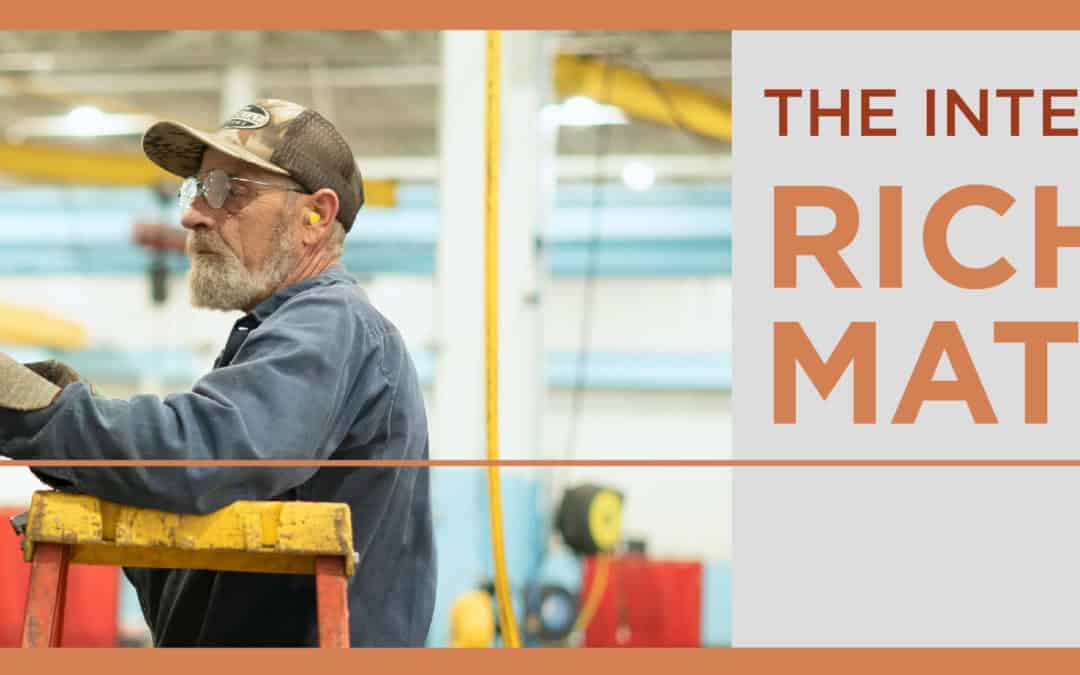
by Scott Stearns | Nov 26, 2018 | Hidden from Archive

Richard has been welding at Imperial Systems for twelve years, and in various other jobs for eighteen years before that. He is a graduate of Jamestown High School. Outside of work he enjoys relaxing with his wife and spending time with his three kids and eight grandkids.
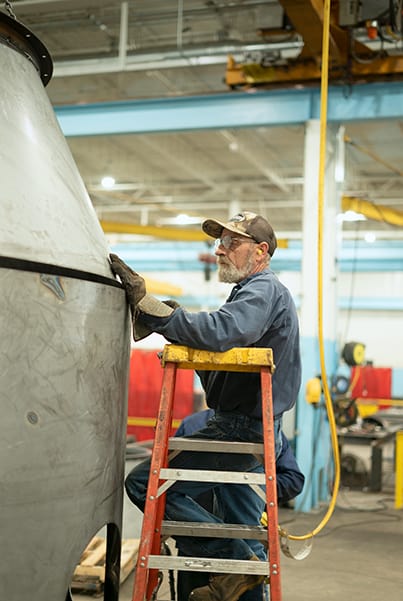 Q: What date did you start working at Imperial Systems?
Q: What date did you start working at Imperial Systems?
A: September 17, 2006
You said it was only that first bay?
A: Yeah. It was probably ten or so guys working. The road crew was there.
Q: That would be pretty tight.
A: Yeah it was for everything we build, like us with the big BRFs. You see how much room the fourteen footers take up here. It was tight, but we did it.
Q: How long have you been welding?
A: Oh jeez. Twenty-five or thirty years. I had thirteen years in at Trinity Industries, twelve here, and five at Tri‑County. I was welding dumpsters and stuff, rebuilding them. Then I worked a couple other places. There was a rail division down in New Castle. I didn’t work there very long because it was too far of a drive from my house. It was an hour and a half each way.
Q: Did you go to trade school?
A: No. When Trinity shut down we did get to go to school. You could keep your unemployment because they moved out of the country and went to Mexico. So they put up a school and you could draw your unemployment while you were in school. Even when I started at Trinity they put me through weld school at Mercer Vo-Tech. It wasn’t a long class, thirty days or something like that. It was heavier. Rail cars. It was big.
Q: How many kids do you have?
A: Three. Two girls and a boy. I’ve got eight grandkids. Two are twin boys.
Q: Do you like any sports?
A: I watch a lot of football. I’m a big Steelers fan.
Q: You got that question correct.
A: I’m a little unhappy with them right now.
Q: What do you do for fun?
A: We usually sit down back. We built a big pavilion and we usually sit down there, me and the wife, drink beer and listen to the radio, build a fire.
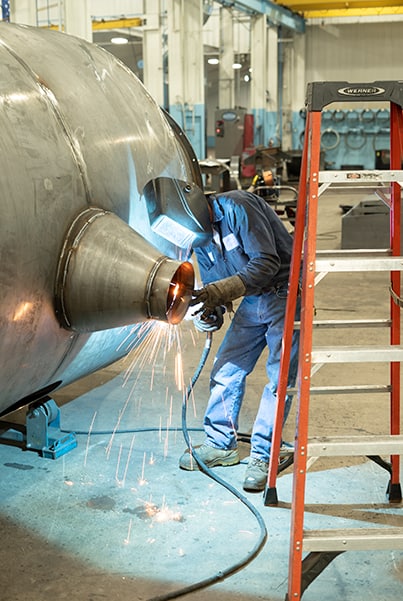 Q: What kind of music do you like?
Q: What kind of music do you like?
A: Country. Willie 95. They’ve changed country so much. Its more getting into pop or something.
Q: Do you ever go to concerts?
A: Nah. Once I went up to Crawford County and George Jones was there. It was a pretty good concert. Loretta Lynn was there too that night, but she wasn’t feeling good. She had laryngitis and was having trouble singing.
Q: Do you have any projects at home that you do?
A: All the time. It seems like the wife always has something for me to do!
Q: You ever go to any football games or anything?
A: No, I always wanted to, but usually I say “Why would I want to go watch that live when I could sit at home and watch it with no crowd?” And usually its too cold, too. I don’t want to be out there in the freezing weather. Then, when you drink like I do you can’t afford to go there with the price of their beer, jeez.
Q: You’re just a good country guy, huh?
A: That’s pretty much it. I don’t bother no one, no one bothers me. That’s what I like. We have a lot of parties though. We have a big Fourth of July party every year. We’ve been doing that for about twenty years now. We invite a bunch of people and get fireworks. Seems like it keeps getting bigger every year. More and more people come, and more fireworks we have to buy. But its fun. We have a lot of fun. We’re out in the country enough that no one bothers you either, thats whats nice.
Q: What do you think about being in the magazine?
A: It’s good. It gets it out.
Q: We’re showing off our employees. We’re proud of you guys. We want you to be known for the work you’ve done. It’s because of you guys that this place…
A: It goes! And that’s good. We need it to keep going for a long time, hopefully.
Q: Do you have anything else you want to say?
A: I do appreciate having the opportunity to work here. I appreciate that. And Jeremiah’s real fair about everything, as far as I’m concerned. He’s a good guy, and good to his people too. There ain’t too many places where on holidays you leave early and they pay you for the rest of the day and stuff like that. I’ve never heard of any companies doing that, not that I worked for.
Read more
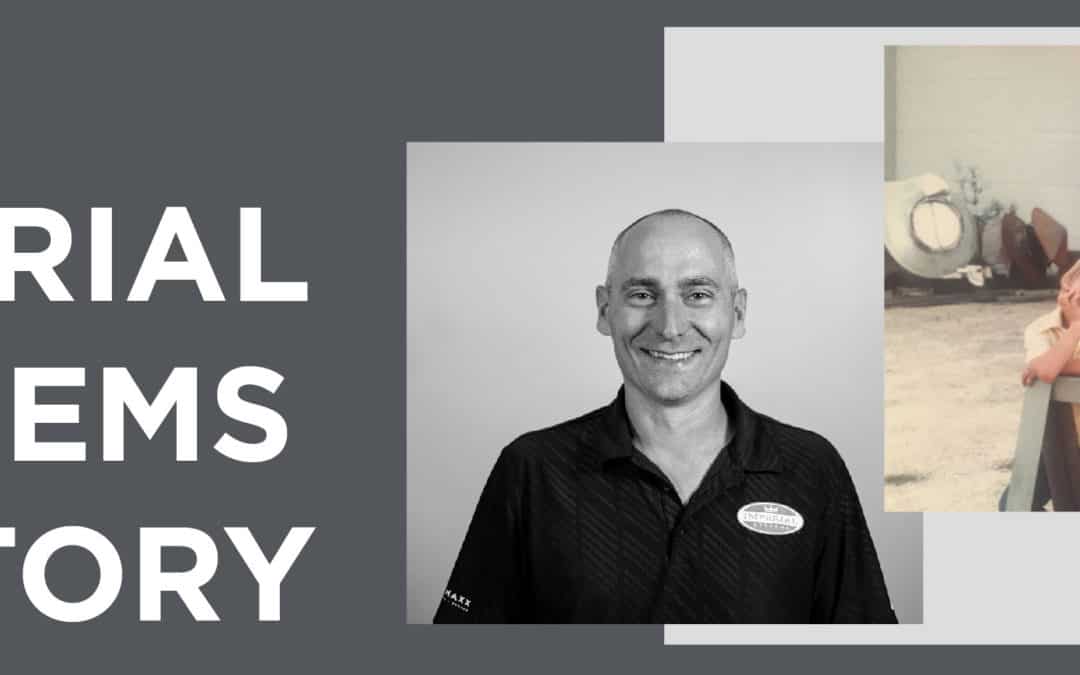
by Scott Stearns | Nov 26, 2018 | Hidden from Archive

For several years, I worked as a Sales Rep for a large, European‑owned dust and fume collection company. Like most of the big companies in this industry, they had an aggressive way of doing business that was not consistent with how I believed things should be done. They called it “filling holes,” which was the practice of sizing dust and fume collection equipment large enough to perform well, but not at a capacity that would minimize periodic filter replacement. Regrettably, I condoned it for far too long. How did I reach the tipping point where I decided to start my own business? My story starts with my granddad.
I grew up in a family-owned and operated sheet metal shop. My granddad, a loving and driven man, had me slagging parts and sorting hardware by age seven. I spent every minute of every summer in and around the shop. It was a noisy, greasy and busy place – and I loved it! At an early age, I was fascinated to learn what a cyclone and baghouse were and how they were built. Warm family gatherings always included shop talk and I would eagerly sit in on those conversations, listening to every word. Today is no different. I still love fabrication and never pass up an opportunity to tour a fabrication facility. Dust and fume filtration is truly in my blood.
I started as a sales rep in my early 20’s. At the time, the industry was led by a couple of company giants who promoted the practice of filling holes. I was quickly taught to stretch the limits, get the orders and move on to more projects. This philosophy was fundamentally against what I had learned growing up in the family business. Unfortunately, top dust and fume collection companies continue with this practice today. But being ambitious and eager to please, I unwisely suppressed my opinion of it and sold collectors in this manner for years. Increasingly unhappy with my circumstance, conviction compelled me to start my own business.
In October 2001, I founded Imperial Systems with the mission that my company would build the best dust and fume collection equipment on earth. Our collectors would be designed and built from an end user’s point of view, last longer and filter better than any other collector on the market. Growing up in manufacturing, I knew that one of our strongest attributes was that we were a company that knew how to design, build and install complete systems from start to finish. This was a distinct advantage over the big companies and still holds true today. Every one of our sales engineers has spent time in the field installing systems so that they understand what they’re selling and what it takes to get equipment properly designed for a dependable installation.
For years we successfully built and sold cyclones, baghouses, ducting and airlocks. In 2010, I decided to expand the company by building cartridge style dust collectors. When we started, we copied a major brand’s collector almost exactly. Unfortunately, this was a mistake for several reasons. For one, it did not differentiate us from our competitors. The technology was old, and by replicating it we made ourselves a “me-too” brand. The only way to compete was on price, which immediately put us at a disadvantage. We were the smallest industrial dust collector manufacturer in the industry. Why would someone buy from us over one of the larger, more established companies? When it was all about price, we would win a job but lost money as a consequence. Regrettably, I realized that copying a competitor was a short-sided strategy. Being a “me-too” company is not what I had envisioned as our future.
So, we regrouped and made some innovative design changes. We committed to build a better cartridge dust collector and differentiate ourselves from our competitors. It was then that I realized that our strength was in our differences. From that point on, we reminded ourselves of this insight at every design and engineering meeting. It became a mantra as we insisted on being innovators, not copiers. That’s when our business started to thrive. Independent sales reps started calling us unexpectedly to represent our product line. We started winning the majority of the quotes that we were working on. It was a new beginning for the newly designed CMAXX, now the flagship of Imperial Systems.
I am proud of the new approach and success that Imperial Systems has had with the CMAXX. The innovations came from customers reporting to us the problems with other equipment that they have had for years. They spoke and we listened. Because of these innovations and loyal customers, Imperial Systems is now the most progressive dust and fume collection company in the industry today. Ironically, CMAXX is now the most copied collector on the market!
I guess you can say we are now doing things right. We’ve emerged with dignity from being an ambitious imitator to an industry thought leader. We are transparent about the solutions we provide to fill needs, not holes. I’m so grateful to my granddad for his influence on my life. And I thank every member of the Imperial Systems team for fulfilling my true vision of this company.
Read more
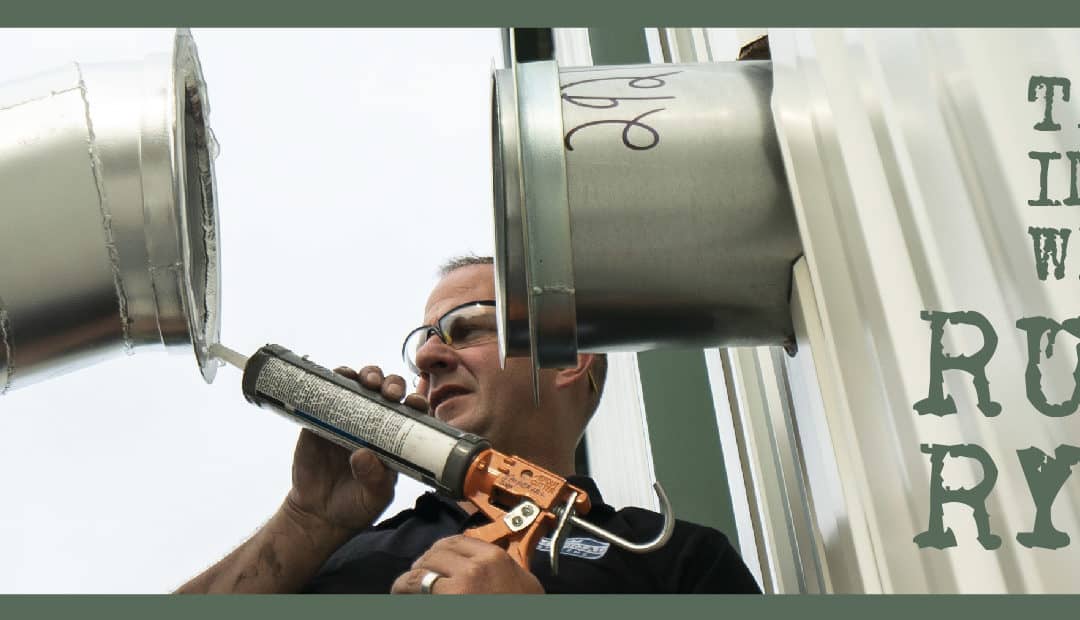
by Scott Stearns | Jul 13, 2018 | Hidden from Archive

Russ has seen it all when it comes to dust collectors. If you have a question that no one else can answer, then you go to Russ. Chances are he knows. Russ has been with the company nearly since the beginning. He now leads the Service and Installation side of the company. Usually when you need Russ the most, you can find him on the other side of the country working on a system. When he is not out on business, Russ likes to spend his time with his wife and three daugters. Before Imperial Systems, Russ also served for his country as a Marine.
Q: You were one of Imperial Systems first employees, right?
A: Jeremiah started the company in March of 2003. He had about 4 or 5 people working for him. I came on in September and now all of the original people are no longer with Imperial Systems. So I’m the longest standing employee.
Q: How many different titles have you had while working here?
A: Fabricator, welder, painting, plasma programmer and operator, drafting, shop superintendent, service technician and Support Services Manager now. A little bit of everything.
Q: How did you get into doing the installs?
A: When I got into the service side, at the time I was the plant manager but it became evident that we needed someone to do the service who was knowledgable with the product and I was the only one qualified. So Jeremiah and Chalmer approached me and asked me if I would be willing to move into the service management position to where I can over see and conduct the service and maintenance on our equipment.
Q: You have been all over the country doing installs, where has your favorite place to visit been?
A: I guess the nicest places to see are out west. Oregon is pretty. Its nice to see out there and how its a lot different than here. When you get out to other areas the scenery is a lot different than what we’re used to. Its neat to see.
Q: Not only have you been all over the country for work but you have been all over the world while you were in the Marines. What countries have you been to?
A: When I was in the Marine Corps I did a Mediterranean Sea float, so I went to Spain, France, Portugal, Italy, Greece, and Indonesia. I also spent six months in Okinawa, and during that time we spent almost a month in South Korea.
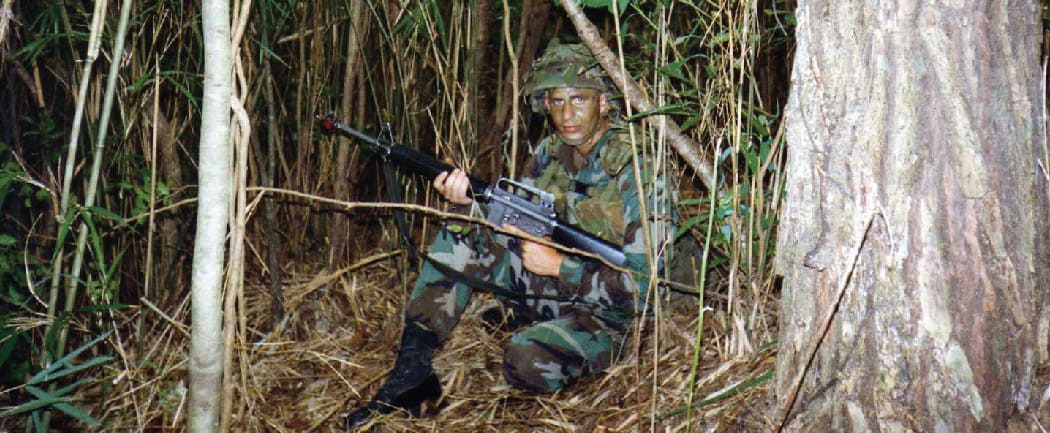
Q: What made you want to be a Marine?
A: It was just something I always wanted to do when I was a kid. I just decided that being in the Marine Corps Infantry was just something that I wanted to do. I always liked guns and shooting stuff so I thought it would be kind of fun. So I did it, and it was an interesting job. I wanted to do the Marine Corps to be the best. A friend of mine had been talking about going into the Marine Corps at the time, so I think he kind of convinced me as well.
Q: What was your job as a Marine?
A: I was a rifleman and worked in the infantry companies as a soldier. We did various jobs on the side. I was an ammo driver and drove humvees, but the main job revolved around infantry.
Q: You knew Jeremiah even before you were a Marine, right?
A: Yes. When I was about fifteen years old one of my close friends moved to Grove City, and when he started school in Grove City he became friends with Jeremiah and thats how I became friends with Jeremiah.
Q: Do you have a lot of childhood memories or shenanigans?
A: Yeah. We did a few shenanigans over the years.
Q: Tell me the history of how you got hired.
A: At the time I was working for CCX as a driver and I was also going to school at night for mechanical engineering. They had a meeting to discuss changes that involved the loss of my bid start times. It would have interfered with my school schedule. So I called Jeremiah and told him that he needed to hire me and I was ready to start for him in two weeks. And he went with it.
Q: What other hobbies do you have outside of work?
A: These day mostly revolve around my kids. I have three daughters and they take up most of my time and energy. They are six, four, and three. If I ever get free time I do some shooting and hunting.
Q: What do you think about how the company’s has been growth since you’ve been here? You’ve seen the whole thing, right?
A: Just a couple guys in a small shop to where we are now is amazing. The company has evolved so much over the years. It was in like a garage when I first started and now its a well established facility. Its been really neat to see the evolution. When we started at the shop in Grove City, it had wood floors and the weld shop portion of that building was tiny. Some of our components had to be built on the road because they were too big to fit through the doors.
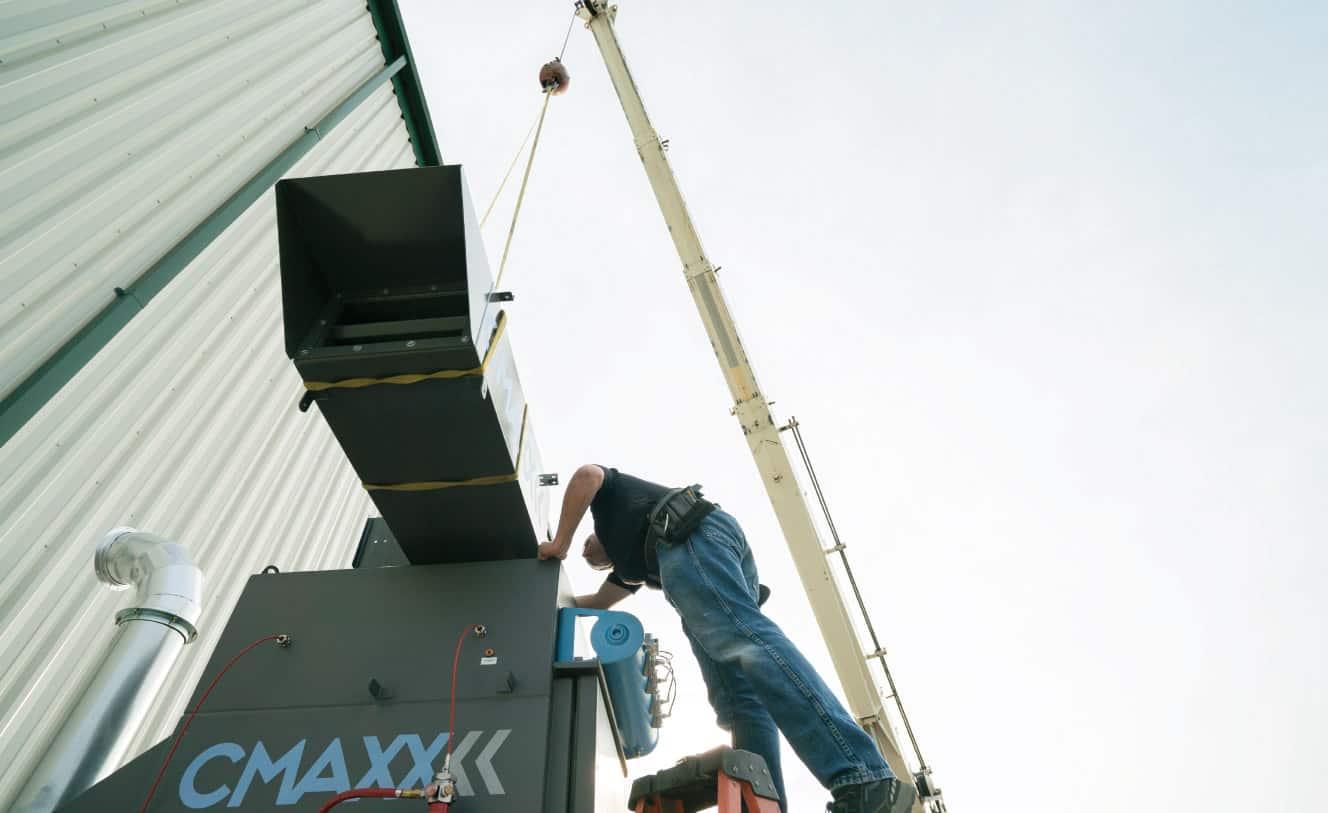
Read more
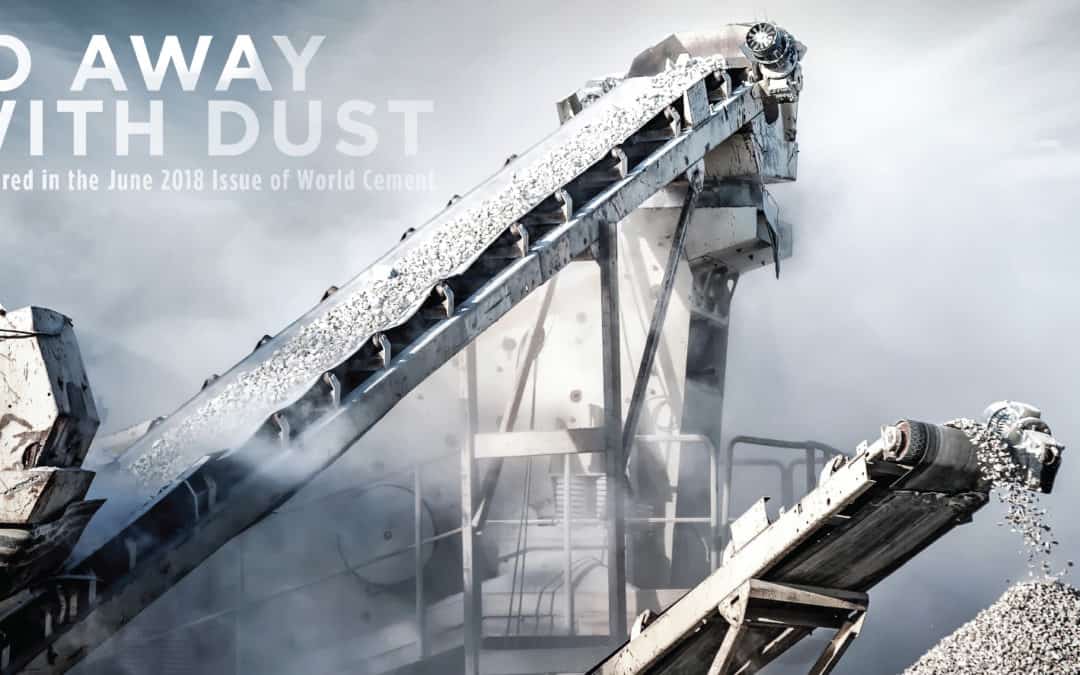
by Scott Stearns | Jul 13, 2018 | Hidden from Archive
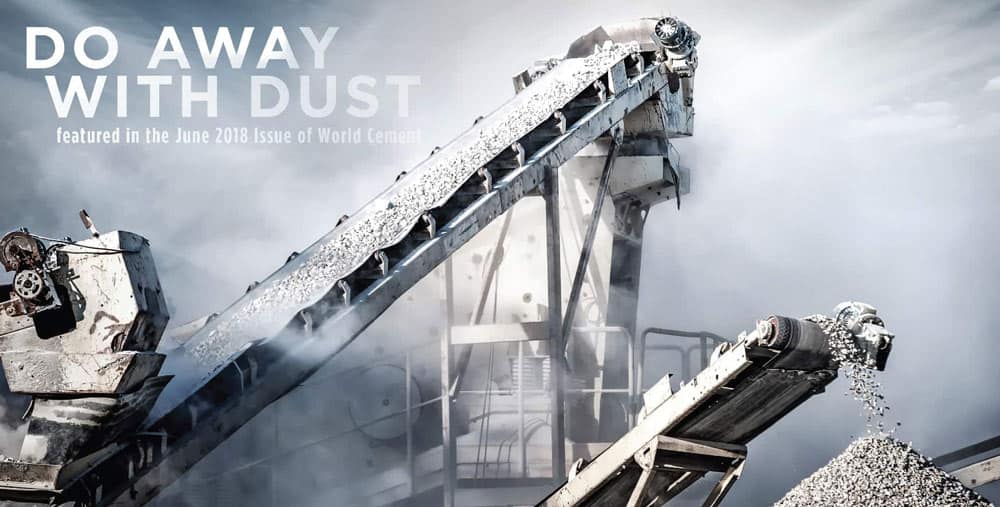
 Jeremiah Wann, Imperial Systems, discusses the benefits of Spot Filters when dealing with dust at cement plants.
Jeremiah Wann, Imperial Systems, discusses the benefits of Spot Filters when dealing with dust at cement plants.
SPOT FILTERS: ALL-PURPOSE CEMENT DUST SOLUTIONS
There are many opportunities when working with cement for dust to start accumulating. Anywhere that the material is moved around, dust is produced. With companies facing new and stricter OSHA silica exposure laws, there is a tremendous need for filters in cement applications. Respirators may not be able to handle the high levels of dust produced, and even if they can, they are uncomfortable and often not used correctly.
OSHA’s hierarchy of hazard management considers the first line of defense as eliminating the hazard. Since it’s probably impossible for you to eliminate all the processes in your facility that produce dust, it makes sense to move to the next step, which is to use engineering controls to manage the hazard. A dust collector is an engineering control because it manages the hazard without the employees needing to actively do anything (like wear PPE) to be protected.
BAGHOUSE VS. CARTRIDGE COLLECTOR
While baghouses have dominated the cement industry in the past, they have many disadvantages. A major one is that very high airflow needs to be maintained to move dust-laden air from the various points of capture to the baghouse, requiring high energy usage and large fans. Also, baghouses often have a huge number of bags, which are very difficult and messy to change. A confined space procedure may be required to get into the air plenum where the filters are accessed. The bags often have to be pulled onto metal cages and there are a variety of complicated mechanisms for attaching them to the tube sheet.
Cartridge collectors are appropriate for almost all types of fine dust, as long as it is dry, and they are more efficient and much easier to change than bags in a baghouse. Cartridge filters are pleated, which allows them to have a much higher surface area than a bag and pack a lot more media into a smaller space. The ease of changing filters and overall maintenance is often a major factor in choosing a cartridge collector over a baghouse. Baghouses may still be preferred for certain applications; a systems engineer can help determine which will work best. High temperature applications, for example, often require a baghouse because the bag material can handle extreme temperatures better. Systems engineers are experts in system design and should always be consulted on a dust collection project.
Many applications, particularly those handling large amounts of bulk solids, have had excellent results with cartridge collectors. Grain and silica industries are two examples of applications where cartridge collectors are often in use. Especially where silica dust is involved, cartridge collectors are becoming increasingly popular because of the extremely high efficiency of the filter media, which helps companies make sure they are meeting OSHA’s new silica dust regulations.
Some companies have questioned whether cartridge filters are durable enough to handle tough applications like silica or cement dust. The answer is that yes, with a properly designed system they can definitely handle this material. Options such as overbags can help protect the filters if the dust stream contains some larger particles in addition to smaller ones. A cartridge collector will also have baffles that cause the air to slow down and larger material to drop out of the air stream before it reaches the filters, protecting them from damage.
SPOT FILTERS
Another issue may pop up with a central vacuum system. Whether it uses bags or cartridges, there may be very long runs of ductwork to access all of the points of dust capture. It may not be practical to run duct all the way down a very long conveyor, for example, or to a machine that’s a long way from the collector. You may even need dust collection on a mobile piece of equipment like a cement dust transport truck that moves material around the site. For all of these situations, spot filters are a great option to consider.
A spot filter is a small cartridge collector that is placed directly at the location where dust is being produced. Examples of good locations for spot filters include:
• Drying areas
• Conveyor belts
• Transfer points
• Dump pits
• Roller mills
• Blenders and mixers
• Bucket elevators
• Hammer mills
• Transport trucks
• Vents and openings in storage areas
• Material loading and unloading
Spot filters usually have two or four cartridges. Because of the pleated material, cartridge filters are perfect for applications where the collector needs to be small and compact. They are also self-contained, which means they do not need any ductwork run to them. They have their own fan and run independently, so you can put one a long way from your central dust collection system, or use them if you don’t have a central dust collection system. Spot filters sit directly at the point where the dust is generated, allowing them to capture the maximum amount of dust and prevent any of it from getting out into the air of your facility or exposing your workers to silica-containing dust.
An advantage of spot filters is also that they are very easy to maintain. In a well-designed collector, cartridges slide out easily on rails and new ones slide back in. This only applies to vertical collectors where the cartridges hang from a tube sheet at the top of the collector; horizontal collectors where the filters are inserted horizontally on a supporting yoke are much more difficult to change. The filters do not need to be cleaned; they clean themselves with compressed air according to their scheduled settings and maintain efficiency by pulsing excess dust off the filter surfaces.
Spot filters are perfect for those areas in a facility where fugitive dust escapes into the environment. This dust can accumulate around the area and cause a health and safety hazard. Certain pieces of equipment may be inconvenient or nearly impossible to reach with ductwork or attach to a central collection system. For these, spot filters can capture that fugitive dust before it gets loose to build up around the area.
A patented version of a spot cartridge collector is specifically designed to be mounted on trucks transporting and unloading bulk dust. Specifically designed for sand on hydraulic fracturing sites, these collectors are able to be mounted directly on a truck that’s used to load and unload cement dust. This is is a complete plug‑and-play system. It can be mounted on sand transport trucks, at the points where material is being moved onto and off of transport belts, and over mixers and other equipment. The fans and airlocks are operated with hydraulics powered by the vehicle, and the compressed air is powered by a generator.
OSHA SILICA REGULATIONS
Because of the silica content of cement dust, new OSHA silica laws taking effect in 2018 will impact health and safety in the cement industry. These new laws strongly endorse engineering controls such as dust collection systems to prevent exposure to silica dust in the air.
In many places, we’ve seen a central baghouse removing dust from several main points of dust production. However, a lot of these places also have a number of other sites where fugitive dust is escaping and contaminating the area, accumulating around the facility. This dust can be easily stirred up and inhaled.
Health risks of inhaling silica dust include silicosis, a chronic lung disease where inhaled silica dust, such as the kind that is a component of cement, damages and scars the small air sacs of the lungs. This results in difficulty breathing and getting enough oxygen to the rest of the body. Exposure can also cause an acute form of silicosis where the damage causes the lungs to swell and fill with fluid. This type of silicosis is uncommon but very dangerous.
Chronic silicosis is very common among people exposed to silica dust. The scarring can progress to a condition called progressive massive fibrosis, where the lungs become stiff and full of scar tissue. When the disease is severe, people may need oxygen support to be able to breathe. Silicosis can cause death.
The health risks of silica include other deadly conditions. Silica is a known carcinogen, meaning it causes lung cancer. It also makes you more likely to get lung diseases like emphysema, tuberculosis or bronchitis. Because the cement industry has been targeted as one in which the dust includes silica, OSHA is likely to be very vigilant about dust management in cement handling applications.
CONCLUSION
Spot filters may be exactly the solution you are looking for if you have equipment such as conveyor transfer points, mixers, elevators, or other places where dust has a tendency to escape. If you don’t have a current dust collection system, or if it’s not practical to attach these pieces of equipment to the current system, a spot filter can be a very efficient solution. It sits directly on the area where dust is produced, captures it before there is any opportunity for it to get out into the air in the facility, and contains it safely.
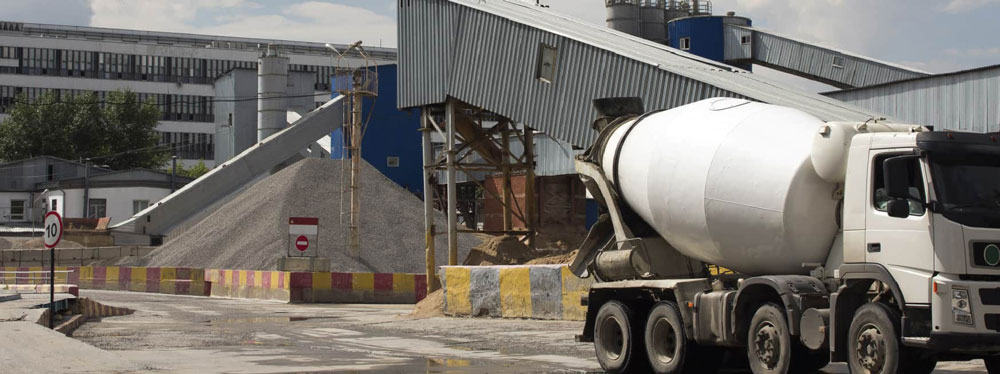
Read more
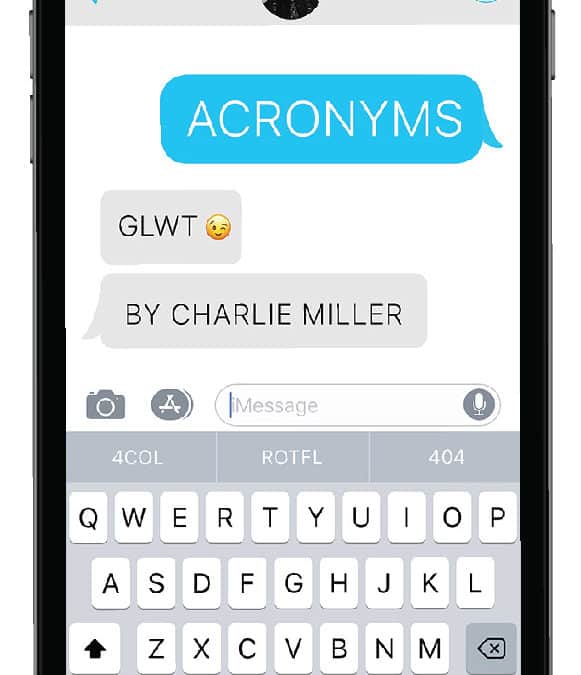
by Scott Stearns | Jul 13, 2018 | Hidden from Archive
 Acronyms! They are the new language. With the explosion of social media and cell phone texting, an old guy like me really needs to consult a dictionary to see what it all means. I’m a NOOB (newbie) and I easily get confused with all the Instant Message and texting shortcuts. I did not grow up with cell phones and being a self‑proclaimed curmudgeon, I find this new language a bit 2F4M (too fast for me). Unfortunately, the written word keeps evolving, and soon our spoken language will depreciate to nothing but a bunch of letters and numbers that only one generation removed would not comprehend. There are even numbers and symbols representing words 4COL (for crying out loud). For instance, *$ means “Starbucks”. MMA*$ means “meet me at Starbucks”. But **// means “wink‑wink, nudge‑nudge.” I’ve not discovered what three asterisks in a row means yet. 404, I haven’t a clue! Yes, 404 does stand for “haven’t a clue”, but I 404 why. And there is an AAAAA (American Association Against Acronym Abuse). That one had me ROTFL (rolling on the floor laughing). There are even acronyms I’ve used my entire life and didn’t know their true meaning. RSVP has been used on invitations and memos long before texting was around. I knew it meant “Please Respond”. But I did not realize it’s the French equivalent and translates to “Repondez S’il Vous Plait.” Maybe the French were more progressive with their acronyms then we were.
Acronyms! They are the new language. With the explosion of social media and cell phone texting, an old guy like me really needs to consult a dictionary to see what it all means. I’m a NOOB (newbie) and I easily get confused with all the Instant Message and texting shortcuts. I did not grow up with cell phones and being a self‑proclaimed curmudgeon, I find this new language a bit 2F4M (too fast for me). Unfortunately, the written word keeps evolving, and soon our spoken language will depreciate to nothing but a bunch of letters and numbers that only one generation removed would not comprehend. There are even numbers and symbols representing words 4COL (for crying out loud). For instance, *$ means “Starbucks”. MMA*$ means “meet me at Starbucks”. But **// means “wink‑wink, nudge‑nudge.” I’ve not discovered what three asterisks in a row means yet. 404, I haven’t a clue! Yes, 404 does stand for “haven’t a clue”, but I 404 why. And there is an AAAAA (American Association Against Acronym Abuse). That one had me ROTFL (rolling on the floor laughing). There are even acronyms I’ve used my entire life and didn’t know their true meaning. RSVP has been used on invitations and memos long before texting was around. I knew it meant “Please Respond”. But I did not realize it’s the French equivalent and translates to “Repondez S’il Vous Plait.” Maybe the French were more progressive with their acronyms then we were.
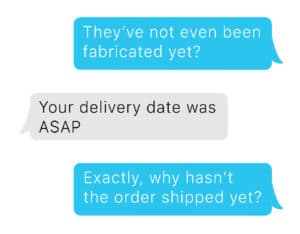
But there are some acronyms that are not wise to use, and I learned the hard way to avoid them. Back in the early years of my career, things were not so different than they are today. Clients would wait until the last minute to place orders or had emergencies because they forgot to order something. Then delivery became critical. They’d say they needed their widget ASAP. So, I enter the order with a deliver date ASAP. And because of the customer’s critical time requirement, I also hand carried the order out and personally give it to the shop foreman, assured this action stressed the critical importance of a rush delivery. When the foreman asked me about the delivery date I said “ASAP.” He said “fine.” That is when I learned ASAP had different connotation depending on your viewpoint. Everyone knows ASAP means “as soon as possible” and, in my NOOB naivety, I assumed the foreman would rush it through the shop that very day. A few weeks went by and B4UKI (before you knew it) my client is calling about the delivery for his widgets. Being a little surprised he had not received them yet, I made another visit out to the foreman to inquire about the order. The foreman starts shuffling through a large pile of paperwork on his desk. Near the bottom of the stack he pulls out my order and says, “Here it is.” A little exasperated by this I ask, “They’ve not even been fabricated yet?” The foreman calmly replies that my delivery was “ASAP.” I said, “Exactly. Why hasn’t the order shipped yet?” His answer was simple. All the other orders in the stack had an actual delivery date. He had to meet those dates first before it was “possible” to get my order out. But he assured me he would do it ASAP. That was the last time I put ASAP as a date on a rush order. I still have clients who put ASAP on their orders and I cringe whenever I see it. ASAP also has a few cousins to avoid. AFAP (as fast as possible), NIY (need it yesterday), and ALAP (as late as possible). There is one more danger to avoid. A real word can sometimes be made into an acronym. In my discussion with the foreman I assumed he knew ASAP meant I needed the order rushed through. He said, “ASSUME makes an ass of you and me.”
If you are as confused as I am with this new acronym language, or if you want to get a handle on the secret code your kids are texting (did you know PIR means “parent in room”), you’re in luck. There are many acronym dictionaries on the internet free to download. That is where I got all the acronyms used in this short essay. But if you think this old curmudgeon is going to start texting acronyms to everyone I know, well, GLWT!
Read more

by Greg | Apr 11, 2018 | Hidden from Archive
Q: You’ve been here at Imperial Systems pretty much since the beginning, right?
A: I started when we were still over in Grove City. Me, Russ, and Steve are the three still left from that original crew. I’ve been here twelve years. I started off doing welding and then did fabrication, and did a little bit of everything. In the past year I’ve been doing a lot of field work and traveling.
Q: How has the company grown since you started?
A: It’s grown like crazy. When I was in Grove City and we were moving to the Jackson Center place, I’d work ten-hour days all week and then go with Russ to Jackson Center and work on the new place. And it didn’t take long before we started to outgrow that.
Q: What do you think about the new building?
A: It was totally necessary for us to be able to grow. We’re already just about full. Since we moved in back in January things are starting to get settled in and they’re running a lot smoother.
Q: How much more do you see us growing?
A: The way things are growing I could see us outgrowing this building someday. We keep getting more and more orders for equipment.
Q: What are your favorite things to do here, since you do some of everything?
A: I like running the plasma table, and I like doing fitting and welding. I run the forklift, and now I do a lot of field work so I’m off traveling around a lot. You get to see some interesting things out there.
Q: What would you tell people about working here?
A: We have a lot of fun working here. Maybe a little too much sometimes. It’s a really good bunch of guys.
Q: And you’re still happy working here after twelve years?
A: Absolutely. It hasn’t been perfectly smooth sailing for the entire twelve years and we’ve had our ups and downs, but it’s a great place to work.

Q: And when you’re not here, you’re at your farm.
A: That’s right. My dad’s the third generation and I’m the fourth generation on that farm. I’ve worked there since I was a kid. We didn’t have sitters… we just went to the farm. If I’m not at work, that’s where I am.
Q: And you’ve got a lot going on there right now with all the baby goats, right?
A: We had triplets the other day. We’re bottle feeding one of them. We had eleven babies out of the five goats I bought on my last trip.
Q: What are you going to do with all these goats?
A: They’re meat goats, Boer goats. They originated in Africa. They can get up to 200 pounds. There’s a big demand for goat meat in some places.
Q: How many goats do you plan on having?
A: My dad and I are still talking about that one. A lot, I know that. My oldest kid, my nine-year-old, is starting 4H this year. He’s got two goats. The younger ones will start here pretty soon.
Q: So you’ve got ducks, chickens, horses, cows, goats, pigs…
A: And my dog, Molly. She’s a chocolate lab. She’s my farm dog. She minds me and no one else, and I love it.
Q: And you’ve got your tractors.
A: I’m into the Mercer County Antique Power Association, antique farm equipment, antique tractor pulls. I have a tattoo of my first tractor. Took a picture of it and took it in to them.
Q: So you’re passing on the farming tradition to the fifth generation?
A: Of course I am!
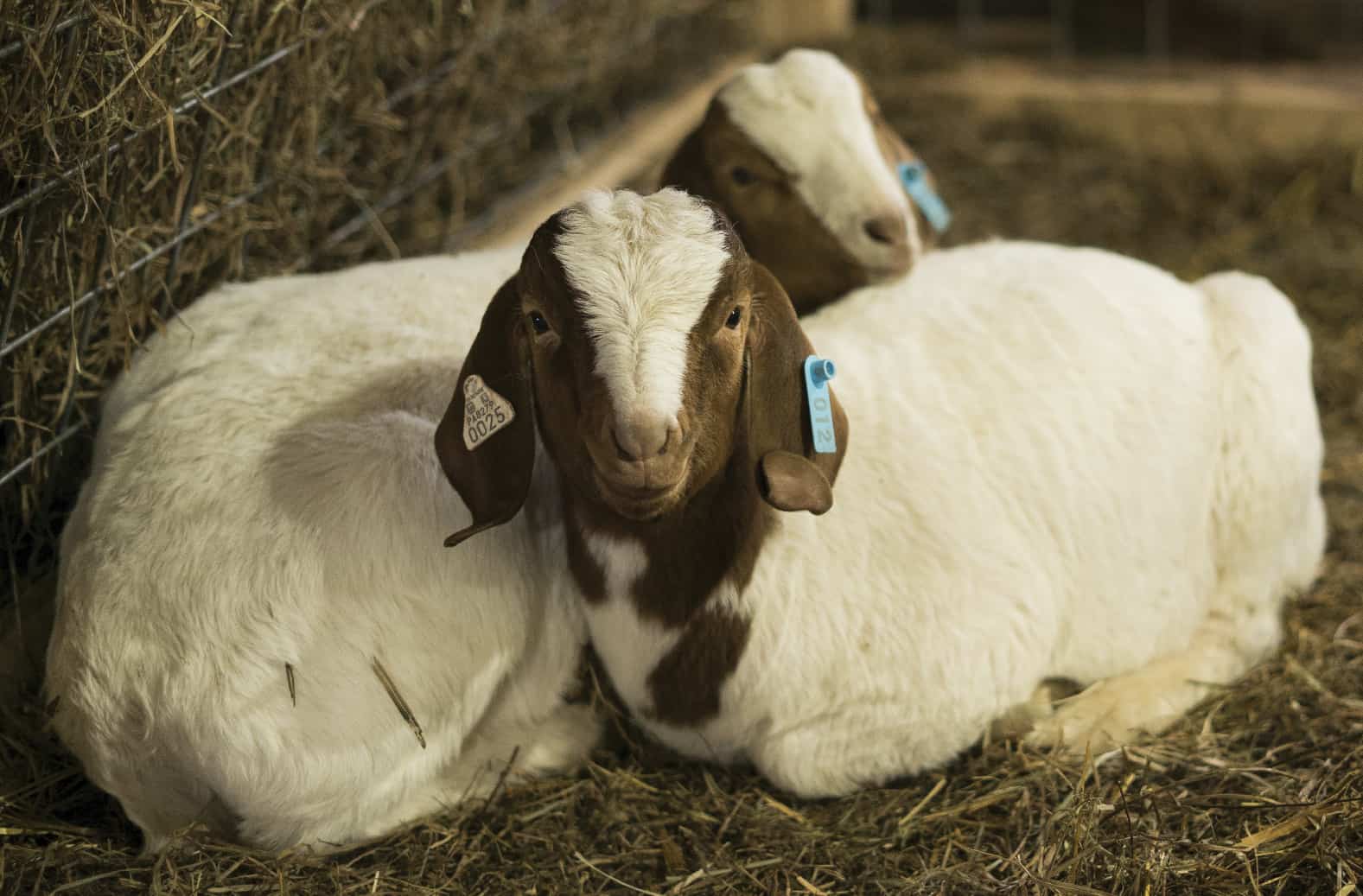
Read more


 Q: What date did you start working at Imperial Systems?
Q: What date did you start working at Imperial Systems? Q: What kind of music do you like?
Q: What kind of music do you like?







 Jeremiah Wann, Imperial Systems, discusses the benefits of Spot Filters when dealing with dust at cement plants.
Jeremiah Wann, Imperial Systems, discusses the benefits of Spot Filters when dealing with dust at cement plants.

 Acronyms! They are the new language. With the explosion of social media and cell phone texting, an old guy like me really needs to consult a dictionary to see what it all means. I’m a NOOB (newbie) and I easily get confused with all the Instant Message and texting shortcuts. I did not grow up with cell phones and being a self‑proclaimed curmudgeon, I find this new language a bit 2F4M (too fast for me). Unfortunately, the written word keeps evolving, and soon our spoken language will depreciate to nothing but a bunch of letters and numbers that only one generation removed would not comprehend. There are even numbers and symbols representing words 4COL (for crying out loud).
Acronyms! They are the new language. With the explosion of social media and cell phone texting, an old guy like me really needs to consult a dictionary to see what it all means. I’m a NOOB (newbie) and I easily get confused with all the Instant Message and texting shortcuts. I did not grow up with cell phones and being a self‑proclaimed curmudgeon, I find this new language a bit 2F4M (too fast for me). Unfortunately, the written word keeps evolving, and soon our spoken language will depreciate to nothing but a bunch of letters and numbers that only one generation removed would not comprehend. There are even numbers and symbols representing words 4COL (for crying out loud).


